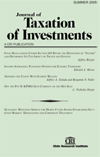Ongoing Uncertainty Regarding Entity Classification for U.K. Tax Purposes: Swift v HMRC
Author: Michael McGowan.; Andrew Howard.
Source: Volume 27, Number 04, Summer 2010 , pp.77-85(9)

< previous article |return to table of contents
Abstract:
The question as to whether a non-U.K. entity such as a Delaware limited liability company (LLC) should be treated as transparent or opaque for U.K. tax purposes can make a significant difference to the amount and timing of tax incurred by a U.K. taxpayer investing in it. The U.K. tax tribunal in Swift v HMRC, a recent first-instance decision, came to the conclusion that a Delaware LLC should be treated as transparent for U.K. foreign tax credit purposes. In so doing, it avoided economic double taxation. However, the decision is surprising because it had previously been thought that in most cases a LLC would be treated as opaque. The LLC in this case does not seem to have had any particularly unusual features. The decision itself may be appealed but it illustrates the uncertain tax treatment that a U.K. investor in an LLC will face and provides a discussion of the issues that need to be considered in resolving that uncertainty. There is also a longstanding question as to whether an LLC can disrupt a U.K. tax group and the decision is relevant to this. This article sets out some of the issues that a U.K. taxpayer considering an investment in an LLC will need to consider by reference to the decision in this case. U.K. taxpayers face similar issues when considering investment in other non-U.K. entities that are not clearly equivalent to English companies.Keywords:
Affiliations:
1: Sullivan & Cromwell LLP; 2: Sullivan & Cromwell LLP.